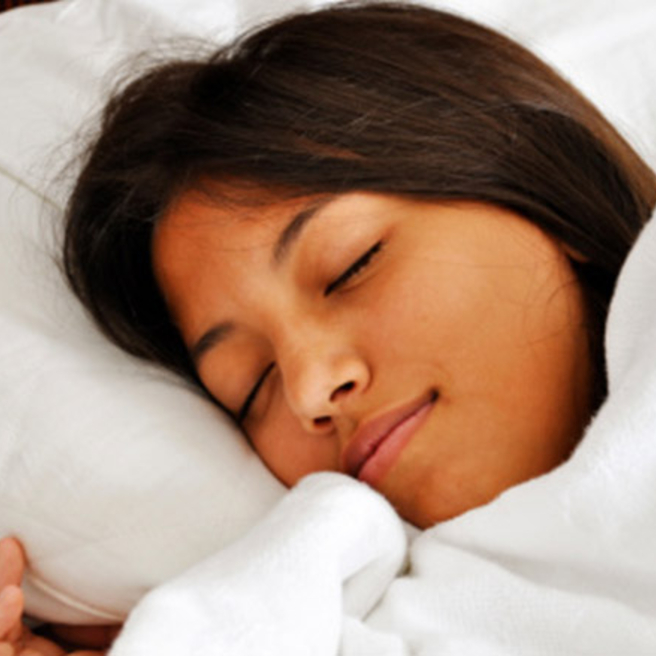
In a new study, researchers from the Minds Matter Concussion Program at Children’s Hospital of Philadelphia (CHOP) found that self-reported sleep disturbances were among the strongest predictors of prolonged recovery from a concussion. The findings were published this month in the journal Frontiers in Sleep.
Concussions are associated with a variety of symptoms. While many children can experience physical symptoms like headaches, dizziness, and nausea, sleep disturbance is also a commonly reported symptom, with patients often reporting changes such as sleeping more or sleeping less after injury, frequently waking up or having difficulty waking up. However, despite being a commonly described symptom, less research has been done to determine whether sleep disturbances can predict whether patients will have a worse recovery from a concussion.
To better understand the role of sleep disturbance and its effect on recovery, researchers used data from the Minds Matter Concussion Registry which includes 4,469 pediatric and adolescent patients diagnosed with concussion who had a clinical visit within 28 days of their initial injury. Roughly two-thirds of patients (3,002, or 67%) reported sleep disturbances at their initial visit to concussion specialty care.
Among the patients who experienced sleep disturbances following a concussion, patients with certain existing medical conditions, such as anxiety, depression, and bipolar disorder, were more likely to report sleep disturbances following their concussion. However, patients who had experienced a prior concussion reported sleep disturbances less frequently than those who had no prior concussion. Slightly lower Child Opportunity Index scores – a neighborhood-level measure of factors that contribute to child health – were also associated with sleep disturbances in patients after a concussion, suggesting sleep disturbances after injury have both physiological and environmental contributors.

“The rates of sleep disturbances reported in this study were higher than anything that’s been previously reported, potentially due, in part, to our inclusive look at both sports-related concussions and those from other mechanisms like assault and motor vehicle crashes,” said first study author James Wilkes, PhD, a research scientist with the Minds Matter Concussion Program at CHOP. “Based on these findings, I recommend that clinicians should monitor sleep issues in children and adolescents who have suffered a concussion to better understand individual risk for prolonged recovery.”

“As more clinicians focus on sleep symptoms, clinicians have a responsibility to be informed about the needs of their patients and treat sleep as an important indicator for recovery,” said the study’s senior author Christina L. Master, MD, a pediatrician and sports medicine specialist and co-director of the Minds Matter Concussion program at CHOP. “Sleep is the second strongest predictor of prolonged recovery, and it’s the strongest predictor that we have an opportunity to address directly.”
This study was supported by the Children’s Hospital of Philadelphia Frontier Program.
Wilkes et al, “Sleep Disturbance after Pediatric and Adolescent Concussion.” Front Sports Act Living. Online March 19, 2024. DOI: 10.3389/frsle.2025.1528458.
Featured in this article
Experts
Specialties & Programs

In a new study, researchers from the Minds Matter Concussion Program at Children’s Hospital of Philadelphia (CHOP) found that self-reported sleep disturbances were among the strongest predictors of prolonged recovery from a concussion. The findings were published this month in the journal Frontiers in Sleep.
Concussions are associated with a variety of symptoms. While many children can experience physical symptoms like headaches, dizziness, and nausea, sleep disturbance is also a commonly reported symptom, with patients often reporting changes such as sleeping more or sleeping less after injury, frequently waking up or having difficulty waking up. However, despite being a commonly described symptom, less research has been done to determine whether sleep disturbances can predict whether patients will have a worse recovery from a concussion.
To better understand the role of sleep disturbance and its effect on recovery, researchers used data from the Minds Matter Concussion Registry which includes 4,469 pediatric and adolescent patients diagnosed with concussion who had a clinical visit within 28 days of their initial injury. Roughly two-thirds of patients (3,002, or 67%) reported sleep disturbances at their initial visit to concussion specialty care.
Among the patients who experienced sleep disturbances following a concussion, patients with certain existing medical conditions, such as anxiety, depression, and bipolar disorder, were more likely to report sleep disturbances following their concussion. However, patients who had experienced a prior concussion reported sleep disturbances less frequently than those who had no prior concussion. Slightly lower Child Opportunity Index scores – a neighborhood-level measure of factors that contribute to child health – were also associated with sleep disturbances in patients after a concussion, suggesting sleep disturbances after injury have both physiological and environmental contributors.

“The rates of sleep disturbances reported in this study were higher than anything that’s been previously reported, potentially due, in part, to our inclusive look at both sports-related concussions and those from other mechanisms like assault and motor vehicle crashes,” said first study author James Wilkes, PhD, a research scientist with the Minds Matter Concussion Program at CHOP. “Based on these findings, I recommend that clinicians should monitor sleep issues in children and adolescents who have suffered a concussion to better understand individual risk for prolonged recovery.”

“As more clinicians focus on sleep symptoms, clinicians have a responsibility to be informed about the needs of their patients and treat sleep as an important indicator for recovery,” said the study’s senior author Christina L. Master, MD, a pediatrician and sports medicine specialist and co-director of the Minds Matter Concussion program at CHOP. “Sleep is the second strongest predictor of prolonged recovery, and it’s the strongest predictor that we have an opportunity to address directly.”
This study was supported by the Children’s Hospital of Philadelphia Frontier Program.
Wilkes et al, “Sleep Disturbance after Pediatric and Adolescent Concussion.” Front Sports Act Living. Online March 19, 2024. DOI: 10.3389/frsle.2025.1528458.
Recommended reading
How to Sleep with a Concussion

Contact us
Ben Leach
Sports Medicine Research